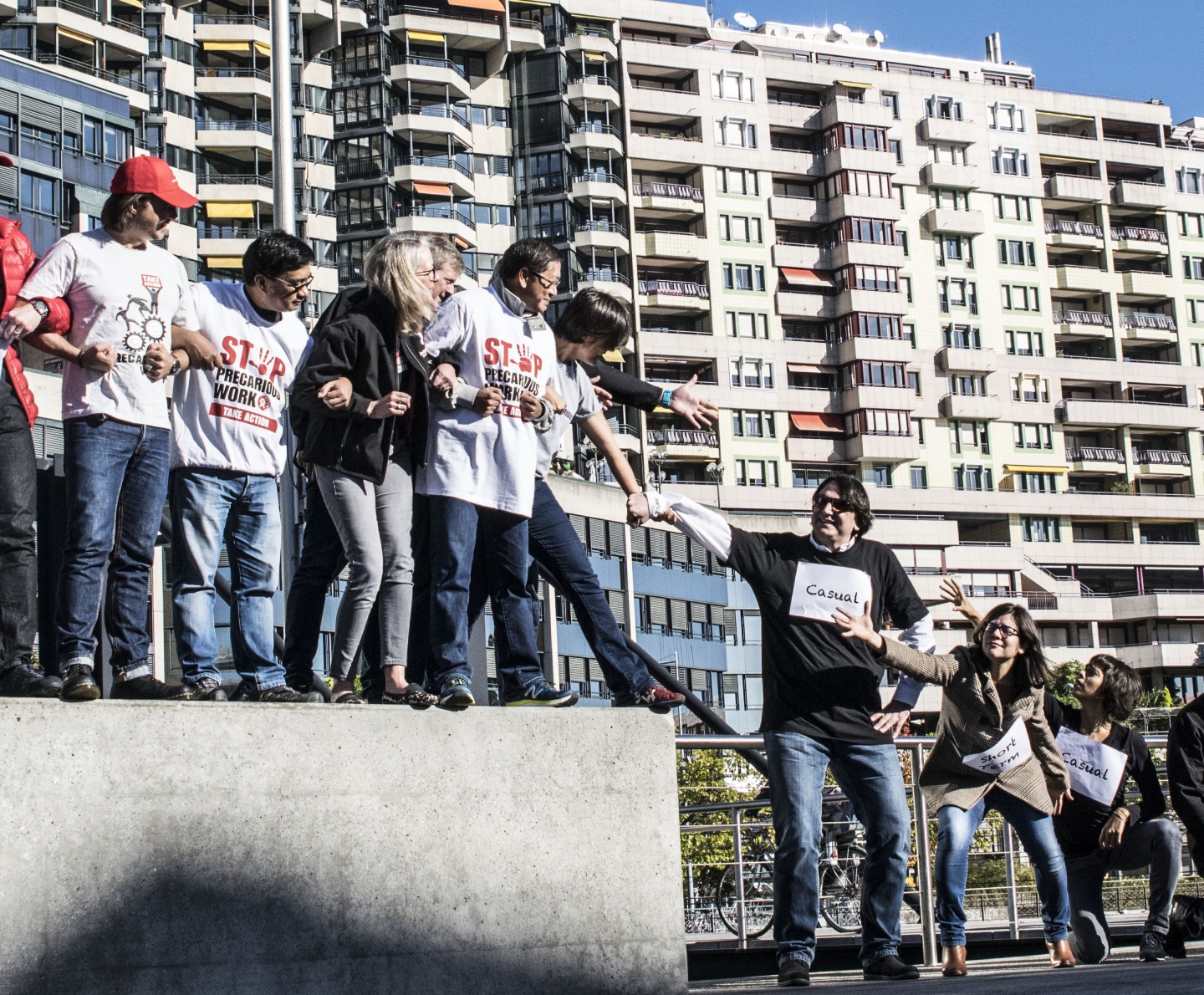6 October, 2017Recent victories against precarious work show that it is possible to adapt to a changing economy without making workers pay the price.
STOP Precarious Work! The words jump out from posters and banners, held aloft by union activists around the world. For years, we’ve been marching, protesting, demonstrating, trying to hold back the growing tide of precarious work that is sweeping away workers’ terms and conditions.
Sometimes we felt like King Canute, who in the 11th century sat by the seashore and commanded the tide not to wet his feet. There has been an explosion of precarious work, and it has seemed unstoppable: temporary, agency, contractor, fixed term, zero hours, self-employed, labour broker. There are many words and many forms, but they all boil down to employers washing their hands of responsibility for their workforce.
The world economy is shifting rapidly. The development of Industry 4.0 means there will be very few jobs for life, and most workers will have to retrain or change the way they work. We won’t return to a world where generations work in the same industry or factory, doing the same shift and the same job for a steady wage. But we can have jobs that are flexible enough to suit a changing economy, but secure enough to guarantee workers’ rights.
Despite the uphill struggle, despite the apparent inevitability, unions have fought back. The fight against precarious work has taken many forms: organizing workers, collective bargaining at company or sector level, global framework agreements with mechanisms to limit precarious work, taking companies to court, changing the law and mobilizing public opinion.
And sometimes, we have won.
An accumulation of small victories may be on the point of achieving critical mass, and turning the tide. If we continue to push, we can reverse the trend. Precarious work belongs to an economic model that is failing around the world, and politically, the moment is ripe for change. We can bring security back.
The most recent dramatic example is the Uber ban in London. The private taxi company is the poster child for the digitized, precarious, platform-based gig economy. Uber has “disrupted” the transport industry by ignoring regulations and relying on its low cost and convenience to get the public on its side.
Hundreds of thousands of people drive for Uber, but the company doesn’t employ them directly. City regulators, established taxi drivers and unions have fought back against Uber. Unions have taken the company to court in a number of jurisdictions.
And it is starting to pay off: IndustriALL affiliate the GMB, which has an Uber drivers’ branch, took the company to the employment tribunal over bogus self-employment. The tribunal found in their favour.
Uber may succeed in overturning the ban, but the company will have to make significant concessions.
This it sets a precedent: couriers for companies like Deliveroo are organizing in many countries, and are likely to be encouraged by the Uber ruling.
In the UK, the use of zero hour contracts sky rocketed in recent years – and has now begun to fall. Zero hour contracts are at their lowest level in three years. No one is sure exactly why – but there has been a public backlash against these contracts after union campaigns to expose how exploitative they are.
There is growing public awareness of how inequality hurts the economy, and the inability of young people to ever have a secure home, freedom from debt, or a pension. Some companies have pledged to stop using zero hours and offer staff guaranteed hours.
In New Zealand, the Unite union has signed collective agreements with McDonalds and many other fast food companies, giving workers more security.
IndustriALL affiliates have organized tens of thousands of precarious workers. In Korea, a ten-year union campaign lead to 6,000 contract workers at Hyundai being given permanent jobs.
In South Africa, NUMSA effectively ended precarious work in the rubber sector, by making it a red line in negotiations with the employer body. In Turkey, Lastik-İş persuaded multinational tyre manufacturers to make thousands of contract workers permanent, and DİSK-Tekstil achieved the same in the packaging industry.
In India, contract workers at the LafargeHolcim Jamul cement plant got secure contracts through the work of their union, PCSS, and IndustriALL. The agreement sets a precedent in the industry, as unions build international networks to coordinate negotiations with multinationals.
These and many other examples show that it is possible to win victories against precarious work. These victories add up, accumulate and set a precedent.
So take heart: join us on 7 October this year to say STOP Precarious Work! This year, our demonstrations can be a celebration of what we’ve won, and resolve to take our victories further.
We can win this fight.





